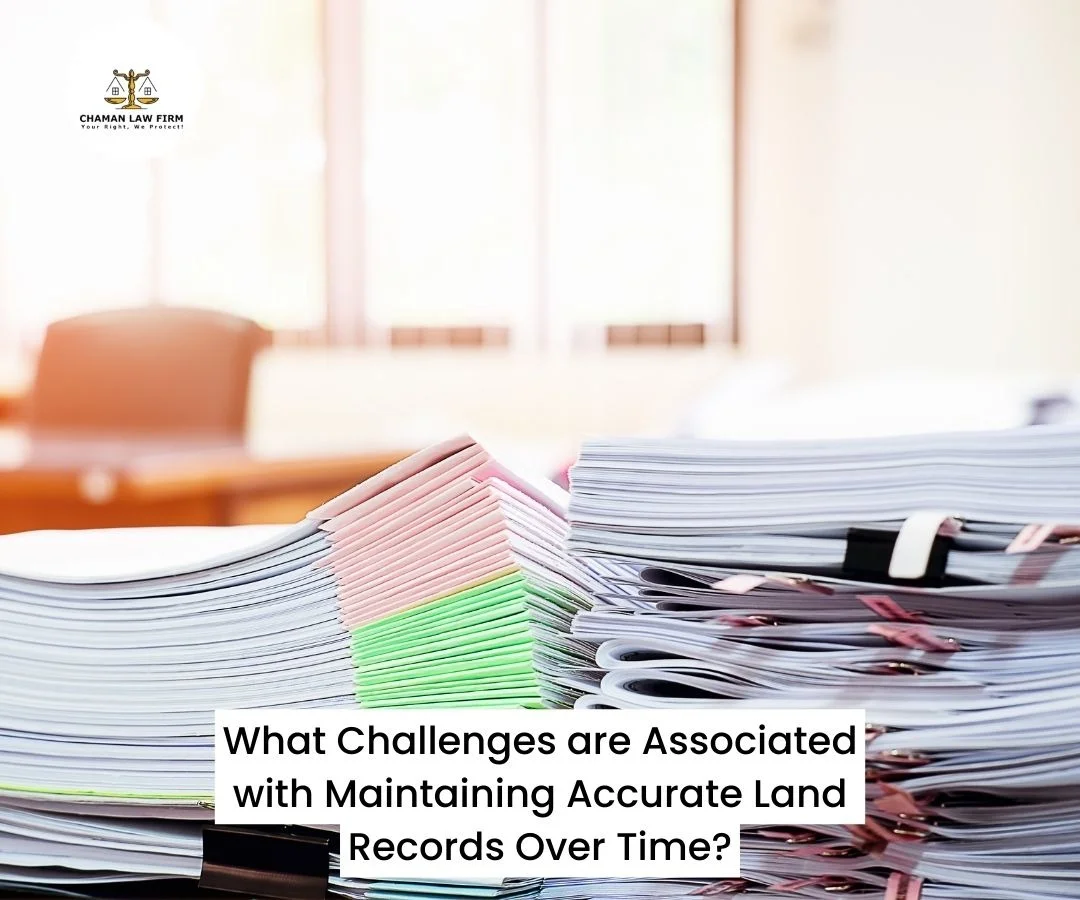What Challenges are Associated with Maintaining Accurate Land Records Over Time?
1. Introduction
Land is a critical asset that underpins development, economic planning, investment, agriculture, and real estate transactions. Maintaining accurate and up-to-date land records is essential for land administration, dispute resolution, urban planning, taxation, and title security. Yet, in many countries—particularly in developing nations like Nigeria—land records are riddled with inaccuracies, inconsistencies, and outdated information.
This article provides an in-depth analysis of the challenges associated with maintaining accurate land records over time, exploring institutional, legal, technical, and socio-cultural factors while also proposing actionable solutions.
2. What Are Land Records?
Land records refer to a comprehensive set of official documents that provide details about:
Ownership and title
Land use and zoning classification
Land parcel size and boundaries
Tenure type (freehold, leasehold, customary, etc.)
Tax and rent obligations
Encumbrances or disputes on the land
These records are maintained by government agencies such as land registries, cadastral offices, local councils, and traditional institutions.
3. Importance of Accurate Land Records
Legal Security: Proof of ownership and protection against encroachment or fraud
Real Estate Transactions: Basis for buying, selling, leasing, or mortgaging land
Revenue Generation: Supports land tax administration
Planning and Development: Informs urban expansion, infrastructure, and environmental management
Dispute Resolution: Minimizes land-related conflicts
4. Institutional and Administrative Challenges
a. Fragmentation of Responsibilities
Different agencies may maintain different records—Ministry of Lands, Surveyor General’s office, local councils—without coordination.
b. Poor Record-Keeping Practices
Manual records are prone to loss, damage, tampering, and duplication.
c. Understaffing and Lack of Capacity
Insufficient trained personnel to manage updates, verifications, and enforcement.
d. Corruption and Bureaucratic Bottlenecks
Bribery and manipulation of records to favor vested interests undermine record integrity.
5. Legal and Policy Challenges
a. Outdated Land Laws
Many countries still operate under colonial-era land statutes that are ill-equipped for modern land management.
b. Overlapping Legal Frameworks
Customary, statutory, and Islamic systems often coexist without harmonization, creating conflicting claims.
c. Lack of Mandatory Update Mechanisms
There’s often no legal requirement or incentive for landowners to update land records after transactions.
d. Insecure Tenure for Informal Landholders
People living in informal settlements or customary areas may lack recognized documentation.
6. Technical and Technological Challenges
a. Lack of Digitization
Paper-based systems are inefficient and vulnerable to damage or loss.
b. Limited Use of Geospatial Technologies
Inadequate application of GIS, remote sensing, and cadastral mapping affects accuracy.
c. Poor Data Integration
Different databases (e.g., tax, survey, land use) often operate in silos.
d. Inconsistent Surveying Standards
Boundary disputes often arise from poorly executed or conflicting survey data.
7. Socio-Cultural and Political Challenges
a. Traditional Landholding Practices
In rural areas, land is allocated and inherited without formal documentation.
b. Resistance to Formalization
Some communities fear that registration may lead to taxation or loss of ancestral rights.
c. Political Interference
Land records can be manipulated for political gains or to settle scores.
d. Gender Inequality
Women often face barriers in land registration due to cultural norms.
8. Financial and Resource Constraints
Inadequate funding for land management institutions
Delays in procurement and deployment of record management tools
Cost of surveys, registration, and documentation is unaffordable for many citizens
9. Impact of Inaccurate or Outdated Land Records
Increased Land Disputes: Conflicting claims and court cases
Fraudulent Sales: Multiple sales of the same plot
Revenue Loss: Government misses out on land-related taxes and fees
Hindered Investment: Uncertainty discourages real estate and agricultural investments
Poor Urban Planning: Leads to slum development and environmental degradation
10. Case Studies and Examples
a. Nigeria
Multiple agencies hold overlapping records. Many states have not fully digitized their land registries. The Abuja Geographic Information System (AGIS) is one exception.
b. India
Land record modernization through the Digital India Land Records Modernization Programme (DILRMP) aims to integrate textual and spatial records.
c. Rwanda
Successful nationwide land registration project using low-cost GPS and community participation.
11. Emerging Solutions and Innovations
a. Digitization of Land Records
Scanning of old documents
Development of digital platforms and portals
b. Use of Blockchain Technology
Immutable records that reduce fraud and ensure transparency.
c. Mobile Mapping and GPS Tools
Allows real-time updating and verification of land parcels.
d. Community-Led Documentation
Empowering communities to map and record landholdings using participatory methods.
e. Public-Private Partnerships (PPPs)
Engagement of private tech firms in record management and infrastructure.
12. Recommendations for Sustainable Land Record Management
Legal Reforms: Harmonize land laws and enforce compulsory record updates
Institutional Integration: Centralized databases for land, tax, and planning
Capacity Building: Train land officials and support community education
Cost Reduction: Subsidize registration fees and survey costs
Monitoring and Evaluation: Periodic audits and geo-verification of records
Transparency and Anti-Corruption Measures: Independent oversight bodies
Conclusion
Maintaining accurate land records over time is fundamental to sustainable land governance. It underpins legal security, reduces conflict, and supports socio-economic development. However, challenges ranging from institutional weaknesses to cultural resistance must be addressed through coordinated legal, technological, and administrative reforms.
Governments, legal professionals, surveyors, and civil society must work together to build land record systems that are inclusive, transparent, and adaptable to changing needs.
📜 Struggling with Land Record Issues? Let’s Help You Secure Clarity and Legitimacy
Outdated, inaccurate, or missing land records can cost you time, money, and peace of mind. Whether you’re buying, selling, inheriting, or regularizing land ownership, accurate documentation is non-negotiable.
At Chaman Law Firm, we specialize in land documentation, title verification, property registration, and resolving land disputes. Our expert legal team helps individuals, families, developers, and communities maintain valid, secure, and compliant land records.
📞Phone: 08065553671, 08096888818
✉ Email: chamanlawfirm@gmail.com
📍 Address: 115, Obafemi Awolowo Way, Allen Junction, Ikeja, Lagos, Nigeria
🌍Click here to learn more about Chaman Law Firm
Don’t let poor records stand in the way of your land rights. Get expert help today.
Chaman Law Firm – Your Right, We Protect.


